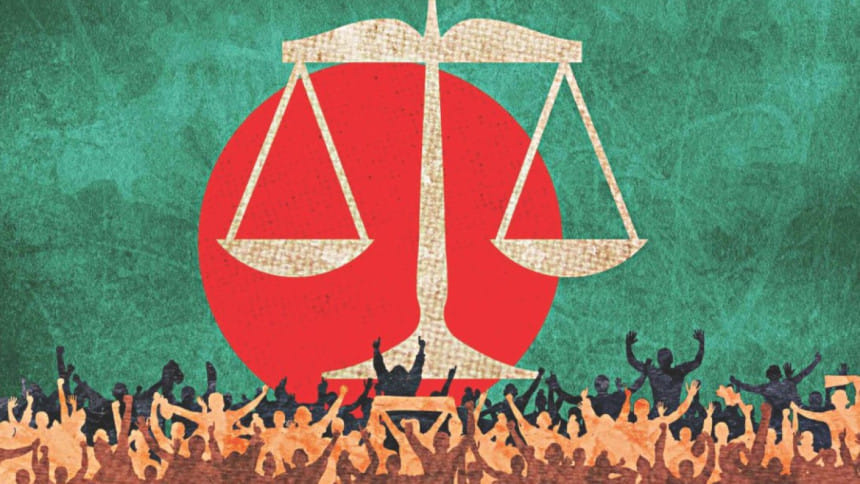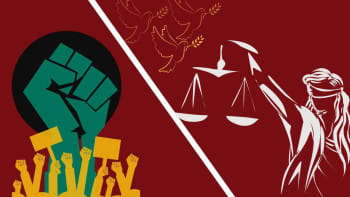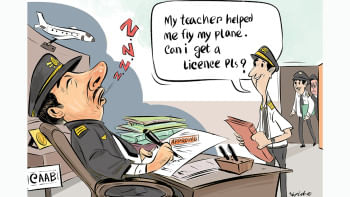Bangladesh's path to a peaceful and equitable society

The fall of Awami League's 15-year rule on August 5, 2024, was a turning point in the socio-political history of Bangladesh. The movement was sparked by student movements, social mobilisations, and civil disobedience against deep-rooted injustice. Nine months on, as the administration of Chief Adviser Dr Muhammad Yunus struggles to attain stability, one painful question lingers: can Bangladesh escape retribution and move onto the path of justice, reconciliation, and peace?
The Office of the United Nations High Commissioner for Human Rights (OHCHR) report categorically puts gross human rights violations in the protests on the doorstep of the Hasina regime. To comprehend the present, we have to trace the roots: after half a century of independence, Bangladesh remains entangled in its colonial legacy. As Johan Galtung argued, when state institutions are based on structural violence, entrenching inequality, exclusion, and authoritarianism, they cultivate a culture of violence. This is articulated not only in physical violence but through discriminatory legislation, uneven access to resources and justice, politicised policing, and elite-driven development—all characteristics of a consequentialist, neoliberal regime.
The ousted regime exacerbated these inequalities by championing mega infrastructure projects while leaving the majority of citizens jobless, voiceless, and vulnerable. What was promoted as progress turned into a system of crony capitalism, where wealth and opportunity circulated within an elite few.
The 2024 uprisings did not emerge in a vacuum. They are the latest in a proud history of youth-led democratic mobilisations in Bangladesh, from the Language Movement of 1952 to the Liberation War of 1971, the 1990s democratic uprising, the 2013 Shahbagh movement, and the 2018 Road Safety protests. Each time, students and young people stood at the frontlines, demanding justice and awakening national conscience. But this time the legacy of past movements inspired students to form their own party, reflecting that they do not rely on existing political parties, but rather, they want to reform the system.
Yet, for as much as the formation of a youth-led party is a radical step in political innovation, it also raises basic questions of sustainability, political maturity, and dangers of reproducing the same exclusions and hierarchies they seek to transcend.
Institutional reform is necessary, but justice must reach further than the courts. Reconciliation—political, social, and moral—is the basis for healing a divided country. The violence in 2024 killed many, injured others, and traumatised a multitude. Students, forced to restore order and help with flood relief, returned to schools without recognition or healing—channelling their pain and hope onto the walls in graffiti. For lasting peace, truth-telling and acknowledgment must be national priorities.
Around the world, truth and reconciliation commissions (TRCs), such as South Africa's, have assisted countries in dealing with past atrocities and healing. Bangladesh also requires such a process, both to punish perpetrators and to remember victims, record abuses, and create a shared memory for generations to come.
The interim government, though unelected, bears a historical responsibility. It must institutionalise a national reconciliation mission, which must ensure several matters.
First, public recognition and reparation for victims of violence, both from the protest movements and state responses, must be provided. Secondly, there should be support for the wounded individuals and families of the deceased, including psychological counselling and financial aid. Third, transparent investigations into abuses of power, especially extrajudicial killings, enforced disappearances, and use of excessive force is crucial. And finally, public archives or commissions to preserve the truth about the 2024 movement including the war crimes of 1971, allowing space for dialogue and memorialisation should be established.
Besides, justice is not merely a function of courts, rather, it is a collective ethical commitment. As philosopher John Rawls argued, a just society is one in which institutions protect the least advantaged and where citizens accept moral responsibility for upholding justice in both public and private life. In Bangladesh's case, this means more than rebuilding institutions; it calls for a shift in societal values.
Citizens must ask themselves: how do we contribute to the systems of injustice, either by action or by silence? Are we complicit in discriminatory practices, or do we stand in solidarity with the oppressed? An emergent new Bangladesh cannot be engineered through isolated legal or administrative change from the top. Without a general moral awakening in which empathy, equity, and civic courage become settled cultural imperatives, any political transformation will remain superficial and vulnerable. Real justice does not just demand new laws, but new ways of living together as a society.
Therefore, renewal at the institutional level is required. Police, judiciary, education, and financial systems must be reconstructed on the foundation of transparency, inclusiveness, and accountability. The policies must address the most vulnerable, with stronger social safety nets, education reform, and decentralisation of development.
No less important is the safeguarding of freedom of speech, press freedom, and academic freedom—freedoms eroded by the previous regime. Democratic growth demands a strong culture of dissent and dialogue. Equally important is the protection of religious-ethnic minorities, including Indigenous people. The state must ensure that secularism, pluralism, and human rights are not abstract ideals but lived realities.
Bangladesh is at a moral and political crossroads. The collapse of the previous regime in 2024 was revolutionary as well as an opportunity to construct a new social pact based on justice, equality, and reconciliation. In the era of the Fifth Industrial Revolution, the colonial paradigm is obsolete. Technologically empowered youth can reveal facts hidden by political elites even in the face of suppressive laws by autocratic regimes.
However, genuine peace cannot be achieved by demanding vengeance or eliminating history. Brave questioning, communal healing, and concerted action are called for. Claiming the entirety of 1971 history is important; limiting it to just the 2024 movement would be a fatal mistake.
The way forward requires more than fresh politicians or statutes—it requires fresh ethical vision. Bangladesh must have a choice between timeless injustices and a world of freedom, dignity, and solidarity.
Md. Lawha Mahfuz is lecturer at the University of Liberal Arts Bangladesh (ULAB). He can be reached at [email protected].
Dr Ahmed Abid is assistant professor of general education at ULAB. He can be reached at [email protected].
Views expressed in this article are the authors' own.
Follow The Daily Star Opinion on Facebook for the latest opinions, commentaries and analyses by experts and professionals. To contribute your article or letter to The Daily Star Opinion, see our guidelines for submission.


 For all latest news, follow The Daily Star's Google News channel.
For all latest news, follow The Daily Star's Google News channel. 







Comments